Wanneer de schuldigen de vinger wijzen: Hypocrisie en ironie onthuld
Waar schuld de spiegel ontmoet: De waarheid achter de beschuldigingen
When the Guilty Point Fingers: Exposing Hypocrisy and Irony
Where Blame Meets the Mirror: The Truth Behind the Accusations

The pot calling the kettle black.
Many say this idiom dates back to a 17th Century translation of the Spanish classic ‘Don Quijote’ by Cervantes.
It’s used when you respond to someone criticizing you for something, when the other person has the very same fault too. Use this expression wisely and with care.
Page Description
Discover the meaning of the phrase ‘the pot calls the kettle black,’ its origins, and how it highlights hypocrisy in accusing others of faults one possesses.
Introduction: The Irony of the Accuser
The metaphor “The pot calls the kettle black” highlights a profound irony: those quick to accuse others of faults often harbor the very same flaws themselves. This saying, rooted in everyday interactions, finds unsettling resonance in the world of justice, where those entrusted with upholding fairness and truth sometimes act in direct opposition to those ideals.
Consider cases like Michael Morton’s, where the prosecutor, the very figure meant to pursue justice, falsified evidence to secure a conviction. Or the Central Park Five, where systemic bias and a failure to investigate thoroughly led to wrongful imprisonment. These examples reveal a deeply troubling reality: the accusers, institutions, or systems that point fingers often fail to hold themselves accountable.
Such failures are not merely ironic – they have devastating consequences. Innocent lives are shattered, trust in the justice system erodes, and the very notion of fairness is undermined. The metaphor reminds us that before casting judgment, we must first scrutinize our own actions and biases. Injustice does not always stem from a lack of evidence or procedure but from the moral lapses of those wielding power within the system.
This section will explore how the metaphor “The pot calls the kettle black” reflects systemic failures, misplaced accusations, and the urgent need for accountability in the pursuit of justice.
De Ironie van de Beschuldiger
De metafoor “De pot verwijt de ketel dat hij zwart ziet” benadrukt een diepe ironie: degenen die anderen snel beschuldigen van gebreken, dragen vaak dezelfde tekortkomingen in zich. Deze uitdrukking, geworteld in alledaagse interacties, krijgt een onheilspellende weerklank in de wereld van justitie, waar degenen die zijn toevertrouwd met het handhaven van eerlijkheid en waarheid soms juist in strijd handelen met die idealen.
Overweeg zaken zoals die van Michael Morton, waarin de officier van justitie – degene die rechtvaardigheid zou moeten nastreven – bewijsmateriaal vervalste om een veroordeling te behalen. Of de zaak van de Central Park Five, waarin systemische vooroordelen en een gebrek aan grondig onderzoek leidden tot onterechte gevangenisstraffen. Deze voorbeelden onthullen een diep verontrustende realiteit: de aanklagers, instellingen of systemen die met beschuldigende vinger wijzen, falen vaak in het afleggen van rekenschap over hun eigen handelen.
Dergelijke fouten zijn niet alleen ironisch, maar hebben ook verwoestende gevolgen. Onschuldige levens worden geruïneerd, het vertrouwen in het rechtssysteem wordt ondermijnd, en het hele idee van rechtvaardigheid raakt beschadigd. De metafoor herinnert ons eraan dat we, voordat we anderen oordelen, eerst ons eigen handelen en onze eigen vooroordelen onder de loep moeten nemen. Onrecht vloeit niet altijd voort uit een gebrek aan bewijs of procedure, maar uit de morele tekortkomingen van degenen die macht uitoefenen binnen het systeem.
In dit gedeelte wordt onderzocht hoe de metafoor “De pot verwijt de ketel dat hij zwart ziet” systemische mislukkingen, ongegronde beschuldigingen en de dringende noodzaak van verantwoordelijkheid in de zoektocht naar rechtvaardigheid weerspiegelt.
1 Immanuel Kant and the Foundations of Integrity
(Exploring Moral Integrity through the Lens of Immanuel Kant: Immanuel Kant’s philosophy highlights profound themes like duty, morality, and integrity, offering a framework that transcends self-interest and inclinations. His thinking bridges the abstract realm of philosophical theory with the practical challenges of moral understanding, providing timeless insights into what it means to act with true moral worth.)
In Episode 6 of his renowned series Justice: What’s the Right Thing to Do?, Professor Michael Sandel delves into the moral philosophy of Immanuel Kant. This episode, titled “Mind Your Motive,” challenges us to examine not only what we do, but why we do it. Kant’s philosophy offers profound insights into moral worth, illustrating how actions motivated by self-interest or consequence—no matter how seemingly good—lack true integrity.
PART ONE: Mind Your Motive
Professor Sandel introduces Kant’s rejection of utilitarianism, a philosophy focused on maximizing happiness for the majority. Kant, however, argues that morality transcends utility; it lies in doing what is inherently right, irrespective of outcomes.
To illustrate this, Sandel shares the story of a shopkeeper who refrains from shortchanging a customer—not out of honesty, but because he fears losing business. Kant critiques this reasoning, asserting that such an act holds no moral worth. True morality stems from acting purely out of duty, untainted by personal gain or external consequences.
PART TWO: The Supreme Principle of Morality
Kant’s philosophy centers on the principle of universalizability—acting according to rules that everyone could reasonably follow. Sandel recounts the story of a 13-year-old spelling bee champion who, upon realizing he misspelled the winning word, voluntarily confessed to the judges. Unlike the shopkeeper, this boy’s actions were guided by an unwavering sense of duty to honesty, regardless of personal cost.
Through such examples, Sandel illuminates Kant’s belief that moral worth arises when we rise above selfish inclinations and act out of respect for universal principles.
Reflection: The Pot and the Kettle
The phrase “The pot calls the kettle black” often refers to hypocrisy—criticizing others for flaws we ourselves exhibit. Viewed through Kant’s lens, it’s a reminder that morality requires self-reflection. Do our actions stem from duty or self-interest? Are we too quick to judge others without first holding ourselves to the same universal standards?
Kant challenges us to measure our motives and principles against the idea of universal law. When we focus on our own moral integrity, we’re less likely to see others as mere mirrors of our flaws—and more likely to act in ways that honor the shared human capacity for reason and respect.
Watch the Episode
Michael Sandel: Justice: What’s The Right Thing To Do? – Episode 6: Mind Your Motive
6. Justice: What’s The Right Thing To Do? Episode 06: “MIND YOUR MOTIVE”
Gepubliceerd op 8 sep. 2009
To register for the 2015 course, visit https://www.edx.org/course/justice-ha….
PART ONE: MIND YOUR MOTIVE
Professor Sandel introduces Immanuel Kant, a challenging but influential philosopher. Kant rejects utilitarianism. He argues that each of us has certain fundamental duties and rights that take precedence over maximizing utility. Kant rejects the notion that morality is about calculating consequences. When we act out of duty—doing something simply because it is right—only then do our actions have moral worth. Kant gives the example of a shopkeeper who passes up the chance to shortchange a customer only because his business might suffer if other customers found out. According to Kant, the shopkeepers action has no moral worth, because he did the right thing for the wrong reason.
PART TWO: THE SUPREME PRINCIPLE OF MORALITY
Immanuel Kant says that insofar as our actions have moral worth, what confers moral worth is our capacity to rise above self-interest and inclination and to act out of duty. Sandel tells the true story of a thirteen-year old boy who won a spelling bee contest, but then admitted to the judges that he had, in fact, misspelled the final word. Using this story and others, Sandel explains Kants test for determining whether an action is morally right: to identify the principle expressed in our action and then ask whether that principle could ever become a universal law that every other human being could act on.
2 A Reflection of Society’s Template
The letter from the school principal doesn’t merely highlight the challenges faced by educators—it serves as a mirror for society as a whole. In its essence, the struggles of teachers—undermined authority, verbal aggression, and an absence of mutual respect—reflect a broader cultural template where personal frustrations are often projected onto others. Just as the phrase “the pot calls the kettle black” captures the hypocrisy of accusing others while ignoring one’s own faults, the principal’s letter exposes a troubling societal pattern: the erosion of accountability and empathy.
In schools, we see this in parents deflecting responsibility for their children’s behavior, refusing to acknowledge disciplinary actions, or attacking the very individuals dedicated to nurturing their child’s growth. But step outside the classroom, and the pattern persists. Whether in workplaces, politics, or public discourse, we observe a similar breakdown of constructive engagement, replaced by blame-shifting and aggressive rhetoric.
This societal mirror invites us to reconsider: how can we build communities where respect is the foundation? How do we reclaim a sense of shared responsibility, where constructive criticism replaces hostility, and individuals recognize their role in collective progress? The principal’s plea for respect in education is more than a call to support teachers—it’s a call to recalibrate the moral compass of society. Without this recalibration, the cycle of blame will continue, leaving us all as guilty as the pot and the kettle.
2 Een Spiegel van de Maatschappelijke Norm
De brief van de schooldirecteur benadrukt niet alleen de uitdagingen waarmee docenten worden geconfronteerd, maar fungeert ook als een spiegel voor de maatschappij als geheel. In wezen weerspiegelen de moeilijkheden van leerkrachten—ondermijnde autoriteit, verbaal geweld en het ontbreken van wederzijds respect—aangaande een bredere culturele norm waarbij persoonlijke frustraties vaak op anderen worden geprojecteerd. Net zoals de uitdrukking “de pot verwijt de ketel dat hij zwart ziet” de hypocrisie van het beschuldigen van anderen terwijl je eigen fouten wordt genegeerd, legt de brief van de directeur een zorgwekkend maatschappelijk patroon bloot: de erosie van verantwoordelijkheidsgevoel en empathie.
In scholen zien we dit terug in ouders die de verantwoordelijkheid voor het gedrag van hun kinderen afwijzen, weigeren disciplinaire maatregelen te erkennen of de mensen aanvallen die zich inzetten voor de ontwikkeling van hun kinderen. Maar stap je buiten het klaslokaal, dan blijft het patroon zichtbaar. Of het nu in werkplekken, de politiek of publieke discussies is, we zien een vergelijkbare afbraak van constructieve interactie, vervangen door het afschuiven van de schuld en agressieve retoriek.
Deze maatschappelijke spiegel nodigt ons uit om ons af te vragen: hoe kunnen we gemeenschappen opbouwen waar respect de basis is? Hoe kunnen we een gevoel van gedeelde verantwoordelijkheid herstellen, waarin constructieve kritiek vijandigheid vervangt en individuen hun rol in collectieve vooruitgang erkennen? De oproep van de directeur om respect in het onderwijs te tonen is meer dan een oproep om docenten te ondersteunen—het is een oproep om het morele kompas van de samenleving opnieuw af te stemmen. Zonder deze herkalibratie zal de cyclus van schuld altijd blijven bestaan, en zullen we allemaal even schuldig zijn als de pot en de ketel.
High School Principal in Zeebrugge Condemns Verbal Aggression Against Teachers in an Open Letter
Article by Radio 2, Jarne Pollie
“How did we get to the point where teachers have become the scapegoats of society?”
With this sentence, principal Joke Knockaert summarizes the issue in her open letter. She primarily condemns the verbal aggression aimed at teachers—not only at her high school but also in other schools and elementary education.
“I had just finished a very emotional conversation between a parent and a teacher,” Knockaert explains. “The parent’s words brought the teacher to tears. When you see someone with 30 years of experience so deeply affected, it stays with you. That’s when I decided to write the letter.”
No More Consequences
“The situation certainly isn’t improving,” she states diplomatically. “Some teachers are afraid to hold parent-teacher meetings alone because parents can be verbally aggressive.” In the open letter, Knockaert describes this as “a torrent of accusations, raw and unfiltered.”
“It also extends to my authority as a principal. I impose a disciplinary measure, and soon after, I get a call from a parent who disagrees with the sanction. They believe their child did nothing wrong and outright tell me their child won’t comply.”
Negative Headlines
“Teachers’ authority is being undermined, and in the meantime, they’re being blamed for everything— even the decline in education quality. This negativity takes a heavy toll on my staff. Over the past two years, several teachers have left the profession, disheartened.”
Knockaert received a lot of feedback on her post, including someone claiming her perspective lacks nuance. “For every post like this, there’s also a story about a child who doesn’t feel safe at school due to a teacher abusing their authority. I see many teachers giving their best, but I also see some who overstep their bounds,” one response reads.
Nonetheless, teachers and students generally get along well.
Addressing the Issue
“Not everything runs perfectly in a school,” Knockaert acknowledges. “But so much good work is being done. Teachers are working tirelessly and have the best intentions for their students. With great enthusiasm, they aim to improve education quality. That deserves some positive recognition.”
According to Knockaert, verbal aggression is not a problem that can be solved politically. “This is a societal issue. I just want to draw attention to the matter so we can talk about it. Only then can respect for teachers and their authority return.”
The full open letter from Principal Joke Knockaert:
“It’s shortly after midnight when my phone buzzes—a message via Messenger. A father, having found hurtful chat messages on his son’s phone, is beside himself with rage. He directs his frustration at me. In a tirade, he writes that he will ‘grab me by the throat’ if this doesn’t stop. You might think: ‘These are isolated cases.’ But sadly, that same morning, I had a conversation with a mother. Her daughter received critical feedback from her mentor and internship supervisor. The mother found this unacceptable. What followed was a torrent of raw, unfiltered accusations. The teacher involved, who had her daughter’s best interests at heart, was torn down with words that cut deeply.
As a principal, I stand by my teachers—I have to. I see how they shrink under each harsh remark, each venomous word. No matter how resilient you are, both as a professional and a human being, it takes a toll. Every day, these teachers give their all. Of course, not everything is perfect. But no shortcoming justifies the shameless way some parents now take out their frustrations.
And as if that weren’t enough, these teachers wake up to read in the news that education is failing. That the bar needs to be higher, that the current standards are insufficient. Media and social media discussions repeatedly create the impression that everything wrong in society is the fault of education. But who looks at the people who make this education happen every day?
I see them. I see how they dedicate themselves wholeheartedly to helping students succeed. I see how they keep trying, even when resources are lacking, even when support from elsewhere is absent. But I also see how they’re slowly losing hope. How every accusation, every lack of respect, cracks their resilience.
How did we get to the point where teachers have become society’s scapegoats? How have we forgotten that respect is the foundation of collaboration? It’s time to give these people, who help shape our children, the respect and support they deserve—not just in words, but in actions. Because without them, there is no future.”
Directeur van middelbare school in Zeebrugge hekelt verbale agressie tegenover leerkrachten in open brief
Artikel door radio 2, Jarne Pollie
“Hoe zijn we zover gekomen dat leerkrachten de pispaal van de maatschappij zijn geworden?”
Met die zin vat directeur Joke Knockaert het probleem samen in haar open brief. Ze hekelt vooral de verbale agressie tegenover leerkrachten. Niet alleen in haar middelbare school, maar ook in andere scholen en in het lager onderwijs.
“Ik had net een heel emotioneel gesprek achter de rug met een ouder en een leerkracht”, vertelt Knockaert. “De woorden van de ouder maakten de leerkracht aan het huilen. Als je iemand met 30 jaar ervaring zo geraakt ziet worden, dan laat je dat niet los. Daarna heb ik die brief geschreven.”
Geen straffen meer
“De situatie verbetert zeker niet”, stelt ze diplomatisch. “Er zijn leerkrachten die bang zijn om alleen een oudercontact te organiseren omdat ouders verbaal agressief zijn.” In de open brief noemt Knockaert het “een stortvloed van verwijten, rauw en zonder filter.”
“Het gaat ook over mijn bevoegdheid als directeur. Ik leg een sanctie op en al snel erna krijg ik telefoon van de ouder die niet akkoord gaat met de sanctie. Zij geloven dan dat hun kind niks mispeuterd heeft. Dan vertellen ze mij doodleuk dat hun kind de sanctie niet gaat volgen.”
Negatief nieuws
“Het gezag van leerkrachten wordt ondermijnd en ondertussen krijgen ze de schuld van alles. Zo ook van de dalende onderwijskwaliteit. De negativiteit heeft een zware impact op mijn personeel. In de voorbije 2 jaar heb ik meerdere leerkrachten gehad die ontmoedigd uit het onderwijs zijn gestapt.”
Knockaert kreeg veel reactie op de post. Onder meer iemand die stelt dat het verhaal ongenuanceerd is. “Voor elk van deze posts is er ook een verhaal van een kind dat zich op school niet veilig voelt omwille van machtsmisbruik door een leerkracht. Ik zie veel leerkrachten die het beste van zichzelf geven, maar ik zie er ook die zich heel veel permitteren”, valt te lezen.
De leerkrachten en leerlingen komen zeker nog wel overeen.© VRTNWS
Probleem bespreekbaar maken
“Niet alles loopt perfect in een school”, erkent Knockaert, “maar er gebeurt zo veel goed werk. Leerkrachten werken zich in het zweet en ze hebben het beste voor met de leerlingen. Met veel enthousiasme willen ze de onderwijskwaliteit opnieuw omhoog krijgen. Daar mag ook wel eens positieve aandacht voor zijn.”
“Het probleem van verbale agressie kan volgens mij politiek niet opgelost worden. Het gaat hier om een maatschappelijk probleem. Ik wil gewoon de aandacht vestigen op de thematiek, want dan kunnen we erover praten. Alleen dan kan het respect en de autoriteit van een leerkracht terugkeren.”
De integrale open brief van directeur Joke Knockaert:
Het is iets na middernacht wanneer mijn telefoon trilt. Een bericht via Messenger. Een vader heeft op de telefoon van zijn zoon kwetsende chatberichten gevonden en is buiten zinnen. Zijn frustratie richt hij op mij. In een tirade schrijft hij dat hij me “naar de keel zal grijpen” als dit niet snel stopt. Je denkt misschien: “Dit zijn toch de uitzonderingen?” Maar helaas, nog diezelfde ochtend voer ik een gesprek met een moeder. Haar dochter kreeg negatieve feedback van de mentor en stagebegeleider. Onacceptabel, vindt ze. Wat daarna volgt, is een stortvloed van verwijten, rauw en zonder filter. De leerkracht in kwestie, die het beste met haar dochter voor heeft, wordt afgebroken met woorden die pijn doen.
Als directeur sta ik naast mijn leerkrachten. Ik moet wel. Ik zie hoe ze in elkaar schrompelen bij elke harde noot, bij elk venijnig woord. Want hoe weerbaar je ook bent, als professional én als mens: het raakt je. Elke dag geven deze leerkrachten alles wat ze in zich hebben. Natuurlijk loopt niet alles perfect. Maar geen enkele tekortkoming rechtvaardigt de onbeschaamde manier waarop sommige ouders tegenwoordig hun frustraties afreageren.
En alsof dat nog niet genoeg is, worden deze leerkrachten ’s morgens wakker om in de krant te lezen dat het onderwijs faalt. Dat de lat hoger moet, dat het niveau niet volstaat. Het zijn de gesprekken in de media en op sociale media die keer op keer de indruk wekken dat alles wat misgaat in de maatschappij, bij het onderwijs ligt. Maar wie kijkt naar de mensen die dit onderwijs elke dag waarmaken?
Ik zie ze. Ik zie hoe ze zich met hart en ziel inzetten om leerlingen vooruit te helpen. Ik zie hoe ze blijven proberen, ook als de middelen ontbreken, ook als de steun van elders wegblijft. Maar ik zie ook hoe ze langzaam de moed verliezen. Hoe elk verwijt, elk gebrek aan respect, als een scheur door hun veerkracht trekt.
Hoe zijn we zover gekomen dat leerkrachten de pispaal van de maatschappij zijn geworden? Hoe zijn we vergeten dat respect de basis vormt van samenwerking? Het is tijd om deze mensen, die onze kinderen mee vormen, het respect en de steun te geven die ze verdienen. Niet alleen in woorden, maar in daden. Want zonder hen is er geen toekomst.
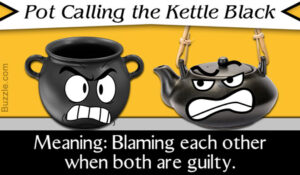
Something you say that means people should not criticize someone else for a fault that they have themselves:
Elliott accused me of being selfish. Talk about the pot calling the kettle black!
Cambridge Dictionary
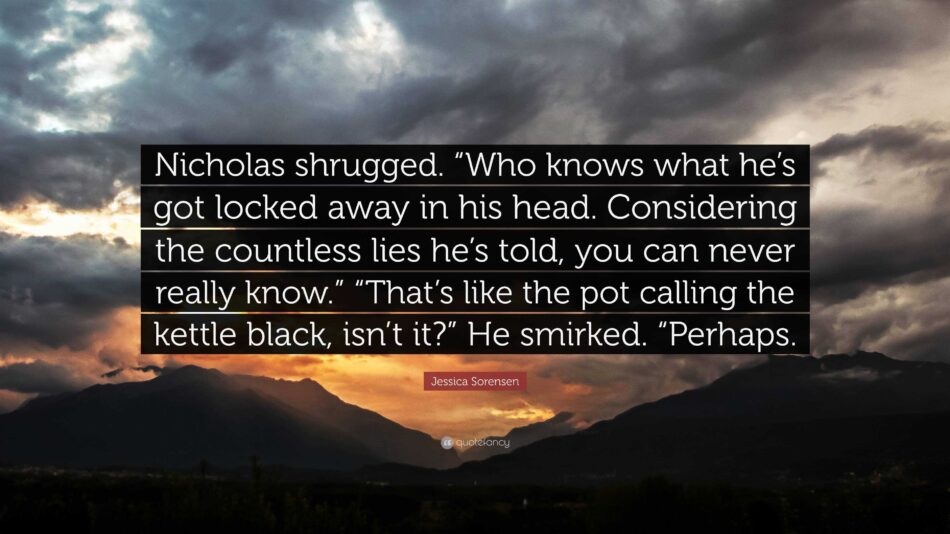
Nicholas haalde zijn schouders op.
‘Wie weet wat hij allemaal in zijn hoofd heeft.
Gezien de ontelbare leugens die hij heeft verteld, kun je het nooit echt zeker weten.’
‘Dat is als de pot die de ketel verwijt dat hij zwart ziet, nietwaar?’
grijnsde hij. ‘Misschien wel.’
— Jessica Sorensen
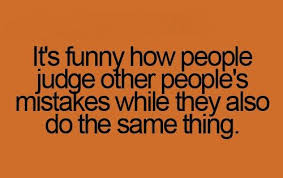
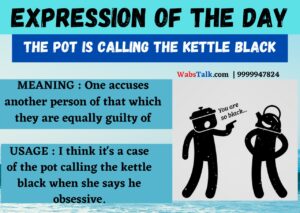
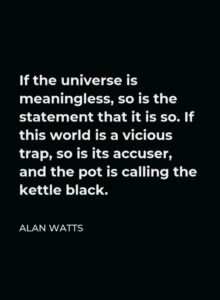
Als het universum betekenisloos is,
dan is de uitspraak dat het zo is, ook betekenisloos.
Als deze wereld een wrede valstrik is,
dan is degene die haar beschuldigt dat ook,
en de pot noemt de ketel zwart.
The key points of the expression “The pot calls the kettle black” are:
Hypocrisy: The saying implies that someone is accusing another person of a fault or behavior that they themselves are guilty of. It points out the hypocrisy of the accuser, as they are no better than the person they are criticizing.
Projection: The expression suggests that the accuser is projecting their own negative qualities or actions onto the other person. It reflects the psychological defense mechanism of attributing one’s own undesirable traits to others.
Irony: The statement is often used in a humorous or ironic context to highlight the absurdity of the situation. It draws attention to the irony of someone making a critical judgment about someone else while ignoring their own faults.
Pot and Kettle Metaphor: The analogy compares the pot and the kettle, both cooking utensils made of metal. When they are heated, they become blackened from soot and grime. The expression uses this similarity to illustrate how both parties in the situation share the same undesirable qualities.
Overall,
“The pot calls the kettle black”
is a simple yet effective way to point out hypocrisy and self-righteousness
in a playful and straightforward manner.
It is commonly used in conversations, debates,
and discussions to challenge the credibility of the accuser.
Weird Shrinking Gift Box Gag
17 mei 2011
Cute girl asks for some help moving a huge gift box onto the roof of her car, but as soon as prank victims look away, it has magically shrunk to a normal sized little gift box. Little do they know that the big box has secretly run off down the street!
A presentation of JustForLaughsTV, the official Just For Laughs Gags YouTube channel. Home of the funniest, greatest, most amazing, most hilarious, win filled, comedy galore, hidden camera pranks in the world!